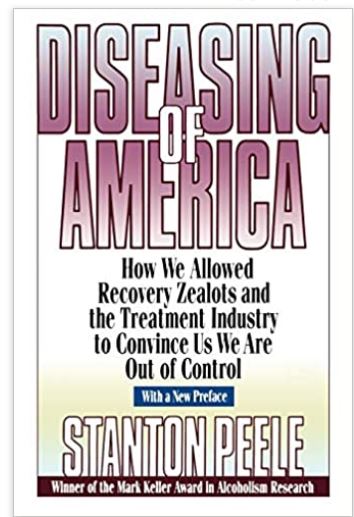The following is an interview with the author of Diseasing of America (1989). A psychologist and an attorney, Stanton Peele is an addiction expert with an international reputation. The author of 120 articles and eight books about chemical and relational addiction, Dr. Peele is a recipient of the Mark Keller Award from the Rutgers Center for Alcohol Studies, and the Lindesmith Award for Career Achievement in Scholarship from the American Drug Policy Foundation.
Q: Dr. Peele, do you believe addiction is a disease?
A: No. Most emphatically not. It has become the style to call negative behaviors, which people often experience as compelling motivation, “diseases.” As though nail biting, overeating, and wife beating were like the malignant growth of cancer cells. Much self-defeating and anti-social behavior has a common thread. People engage in it because they feel degraded and disapproved of, which feeds into their motivation to continue the negative behavior. But how ultimately do people stop drinking too much, overeating, and biting their nails? They feel, internally, that the balance of their desires and rewards is not to act this way; people make positive choices when they feel they have the opportunity to engage -and are supported – in more positive choices. The toughest addiction to quit is smoking. Right now about 50 million Americans have quit smoking, over 90% without a patch or formal therapy.
Q: How have we progressed to thinking about addiction as a disease?
A: We have developed a faith in medical advances that is steeped in the legend of the “microbe hunters”, the generation of researchers and physicians who identified the bugs that cause many of the major killers of humans. This worship of medicine has become a fetish in North America. If we can describe a malady in medical terms, we feel we have somehow conquered it. Yet with psychological disorders and problems of behavior, namely addictions – such labeling and accompanying medical mumbo jumbo have not led to improvement in treatment outcomes. In many ways, in fact, turning our sense of ourselves over to medicine seems to be making things worse. Surveys repeatedly confirm that a generation of education about addiction has led to people’s spiraling out of control now more than ever.
Q: What is the science on which the disease proponents of addiction base their demand for considering addiction a disease?
A: There is no inherited mechanism that leads a person to be unable to control their substance use, to go on tremendous binges, or to leave off their connection to people and environments in order to consume a substance. Genetic theories, being the modest things they are, can never explain the experience of loss of control. An overview of the research on alcohol and drugs NEVER supports the wild claims made by some proponents of the disease model. These claims reflect fundamentally antiscientific attitudes and a lack of understanding of the confluence of human motivation in response to experience, biology and external stimuli.
Consider this example: A 1996 headline in The New York Times declared that brain images of addiction in action show its neural basis. The article reviewed research showing that many different drugs—namely heroin, alcohol, amphetamines or nicotine—activate common neural pathways. Its author surmised that these drugs bathe the neurons at these sites so as to reduce natural supplies of dopamine, and thus stimulate a craving for more of the drugs to compensate for this depleted supply of the neurotransmitter. And this was taken to mean that addiction is purely brain driven.
In my critique of this folly I explain that a wide range of activities stimulate the same pleasure centers of the brain — including sex, eating, working, consuming chocolate. This should alert us to the fact that these brain theories tell us nothing about differences in behavior, let alone addiction. Apparently, stimulation of a pleasure center is only one small component in the entire addiction syndrome. Moreover, if any activity can be pleasurable —from work, to sex, to parenting and so on—identifying activities as stimulating the pleasure center simply begs the questions: Why do people find different things pleasurable and why do different people react in destructive, addictive ways to some of these things, while others incorporate them into a balanced overall lifestyle?
__________
Dr. Peele’s position is at odds within the drug reform movement. He is a proponent of harm reduction policies such as needle exchange, but is a strong opponent of a treatment industry that relies, for the most, on coercing addicts into rehabilitation.
©2000 Ilana Mercer
The Calgary Herald
June 29
CATEGORIES: Drug War, Junk Science, Pop Psychology, Psychiatry & The Therapeutic State, Science & Junk Science

 print
print